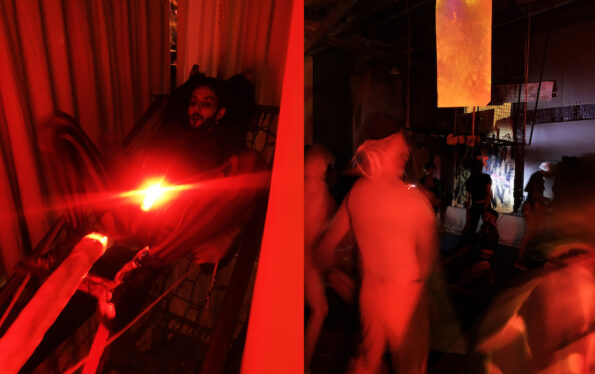Search
To search for an exact match, type the word or phrase you want in quotation marks.
A*DESK has been offering since 2002 contents about criticism and contemporary art. A*DESK has become consolidated thanks to all those who have believed in the project, all those who have followed us, debating, participating and collaborating. Many people have collaborated with A*DESK, and continue to do so. Their efforts, knowledge and belief in the project are what make it grow internationally. At A*DESK we have also generated work for over one hundred professionals in culture, from small collaborations with reviews and classes, to more prolonged and intense collaborations.
At A*DESK we believe in the need for free and universal access to culture and knowledge. We want to carry on being independent, remaining open to more ideas and opinions. If you believe in A*DESK, we need your backing to be able to continue. You can now participate in the project by supporting it. You can choose how much you want to contribute to the project.
You can decide how much you want to bring to the project.

I was diagnosed as hiv positive 25 years ago. I had just turned 20. I had picked up a guy cruising at Plaza Pakistan and he took me to his apartment nearby. We had sex without a condom and he came inside of me without warning. As soon as he came he went to take a shower, without saying a word. I was stunned. It didn’t feel like rape so much as a common heartbreak. It was my birthday week. My skin soon became covered in hives and I had a high fever for 3 days straight. “I got lice,” I thought. I went to get tested at the Muñiz Hospital in Buenos Aires. I wanted to find out for myself. Voluntary individual testing was not very accepted at that time. Diagnostics from close-body contact was denied. Wanting to know one’s serological status was contradicting the cultural mandate of getting sick and dying.
In the Retrovirus Laboratory, a doctor handed me the exams and explained the immediate result: viral load and CD4 analysis. The Muñiz hospital is surrounded by a park. Under a scorching sun, my legs went weak, my eyes clouded over, my heart rate accelerated, and I fell down. I got my breath back while sitting on the curb of an alleyway. I read it again: “POSITIVE.” Done! I’m a fucking aids victim at 20. Cultural sentence served. “You are going to end up dead in a ditch!” my mother cursed me for being a faggot.
“A ‘positive’ result only indicates contact with the virus. It does not necessarily imply illness or severity of the disease.” I learned that this final clarification placed in the results was a phrase metabolized thanks to the activist struggle against the metaphors of war and plague propagated by medical science, metaphors that performed the institutional and social abandonment and the cultural and physical death sentence of millions of infected people around the world.
After I left the hospital, I called my brother (also a faggot) from a public phone to let him know. “You’re an idiot!” is the first thing he said to me, a punishment faithful to the script of cultural abuse. I hung up. I called a gay friend of that time. “Come over,” he said. He was waiting for me with a phone number. “Call this number. You’re not going to deal with this alone, you need company.” It was the number for Nexo [1]One of the first civil organizations working with hiv/aids in Argentina, created in 1992 by a group of gays. They published the monthly magazine NX, aimed at the homosexual community, which included … Continue reading. That night, trembling with fear, I read Susan Sontag’s aids and Its Metaphors (1988). My life journey had restarted. I needed new software to build my immunity to the virus.
Along with activist journalism, Nexo had a health center and free workshops. I was surprised to find myself, two days after the diagnosis, in the discussion group for people living with hiv, coordinated by Carlos Mendes, a doctor, hiv positive and co-founder of the organization. The group had recovered a practice from second-wave feminism of the 60s, that is, gaining awareness of one’s own situation in a group. People meet to talk about a common problem and/or oppression, producing what Ann Cvetkovich calls an “intimate public sphere.” [2]Cvetkovich, Ann. An Archive of Feelings: Trauma, Sexuality and Lesbian Public Cultures (2003). The idea is that “trauma is best worked through by public and collective actions, rather than private and therapeutic ones.” At the same time, this circle cultivated and updated the legacy of study groups, outside the university, which in Buenos Aires date back to the 60s. An action carried out in the environment of its participants where it is clear that the production of knowledge is contingent and collective. The reading aloud of texts and group conversations introduce a sonorous eroticism and an inclusive tonal variation that multiplies the readings mixed with the life stories of the participants. A “tongue-like pleasure,” like that of the mouth of the madwoman who Pedro Lemebel mentions in Loco afán. Crónicas de sidario (Crazy Rush: Chronicle of Someone with Aids) (1996).
Carlos made us read Baruch Spinoza’s Ethics. aids, for Carlos, was a disease-denouncement of cultural mistreatment. aids had first been detected in a cursed homosexual town of marginal, enslaved black people. To understand aids we had to question the beliefs and meaning of power in a culture that produces injustice and damage. At the same time, the virus generated an immunological deterioration in bodies, weakening their self-defense. The relationship between power and defenses seemed immediate, but what kind of power can sick people exercise in the dominant culture? For Carlos, this power was a viral “realization” which implied a subjective work of cultural deprogramming and a reconfiguration of oneself. In a culture where not everyone has the right to defend themselves, only those who are sick and cultivate some form of power can do so.
We read Ethics as opposition, that is, not in the existential comfort of the academy but in the need and urgency of a group infected by the viral load and power of aids. I read Ethics with death in my body, afraid of dying for being a faggot and fulfilling my mother’s micro-fascist wish. An incorporation by contagion into a social space that a collectively read text can open. A practice of strategic reading to persevere in existence and not to die of fear. The metaphorical inflation of aids threw us into living in “the republic of fear,” as Marta Dillon describes it in Living with Viruses. The equations “aids=death” and “aids=pink plague” functioned as lethal judgments and sentences for infected people, even when the epidemic was already a global pandemic.
It was not only a physical but also a social and cultural death. To suffer the abandonment of a person by the State and its institutional violence, or to receive systematic rejection from everyone. Not to be able to access the world of work nor the health system of prepaid social services. Not to be able to have sex without guilt or not to be able to love without fear. Not to be able to count on your family and friends. An endless number of exclusions shaped the daily life of helplessness and desolation. The positive diagnosis burst into our daily life and produced a traumatic encounter with the idea of death. A diagnosis-challenge that “creates an abrupt break with culture, suddenly transforms us into countercultural beings as long as we persist in being alive,” wrote Carlos Mendes, in aids and Power (2004), his only published book. An infectious legacy/archive of molecular awareness.
With aids, we were educated in death, like characters in tragic theater. The experience of vulnerability challenged us: How did I live before aids and how do I want/can I live now? Or better yet: “What does it mean to survive?” as Dillon asked herself in the public conversation “Lesbians and hiv” (2024), together with the activist Mónica Santino, the first visible lesbian on Argentine television. The affective-epistemic work of methodically “revealing, criticizing, working and exhausting” metaphors, as Sontag demanded from the late 1980s, was essential to continue living. The war-like metaphor that medical science had installed in our bodies was destroying us. First, illness is not a war, it is a vital experience, it is part of health and not its opposite. Second, illness is not an invading foreigner, it is historical and has to do with our own history and with all of humanity. Third, the body is not a battlefield where a war can be fought. At most, it is a field of social and intra-material forces from which we make a life. And lastly, symptoms are not enemies to be eliminated, they are an event in the body to be felt, recognized, understood and, when harmful, cared for and cured. To abandon the war-like metaphor meant being able to coexist with the virus, to give up multiple paranoia, get rid of the stigma of sexual punishment, negotiate one’s health with the medical system, make use of the pharmacological resources of antiretrovirals as a strategy to put limits on the virus. The most creative act is to compose a life with aids. That is, to live with the experiential knowledge that we are not immune or individual but rather vulnerable and interdependent. Being alive is a risk, it requires flexibility and responsibility. Making meaning for each singular life requires inventing, with great precision and the immense work of the imagination, the metaphors with which we can live.
[Image credit: Photographic record by Carlos Herrera of the performance installation Gente del cuero (Leather People), 2022 by the collective Princesas del Asfalto (Concrete Princesses), co-founded by Silvio Lang, at the MUNAR Art Center in Buenos Aires.]
| ↑1 | One of the first civil organizations working with hiv/aids in Argentina, created in 1992 by a group of gays. They published the monthly magazine NX, aimed at the homosexual community, which included the dossier NX(+), dedicated to the dissemination of critical information on hiv/aids. |
|---|---|
| ↑2 | Cvetkovich, Ann. An Archive of Feelings: Trauma, Sexuality and Lesbian Public Cultures (2003). |

Silvio Lang (1979, Santa Rosa, La Pampa) Argentinean queer artist, based in the city of Buenos Aires. He is dedicated to stage direction, cultural activism, theoretical writing, artistic teaching and research in performative practices. With 28 years of experience as a director, some of his artistic creations are:: Tango Nómade, Querido Ibsen: soy Nora; Meyerhold: freakshow del infortunio del teatro; El fiord; Diarios del odio; Pasadas de sexo y revolución; Movimiento público, Intimidad de lo común. He is co-founder of the collectives: ORGIE, Comparsa Drag, Princesas del Asfalto, Escuela de Técnicas Colectivas and Escena Política. He is part of the movement Afectariado Combativo.
"A desk is a dangerous place from which to watch the world" (John Le Carré)